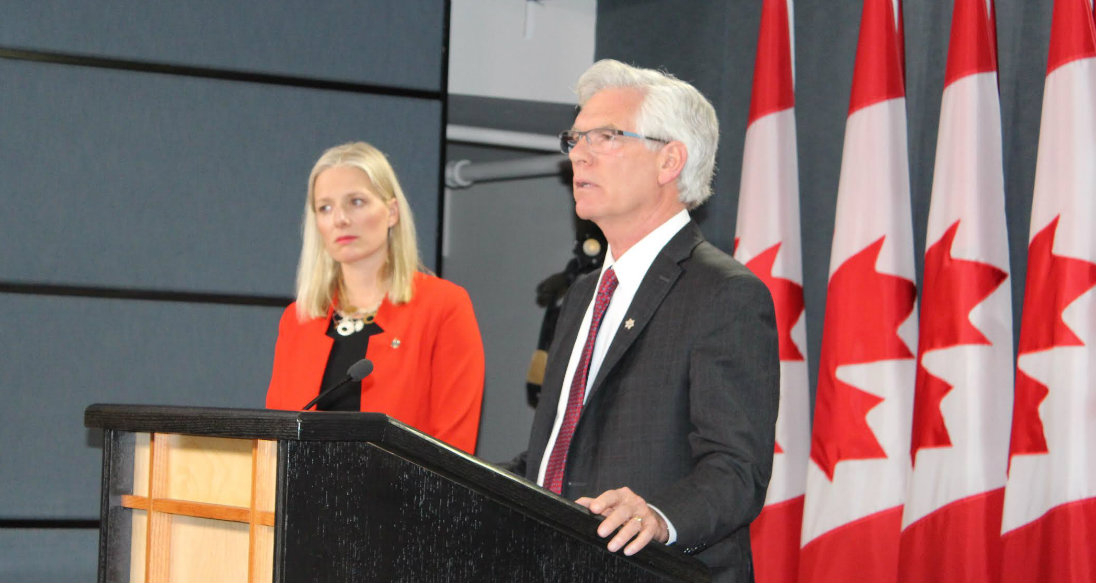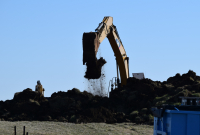Support strong Canadian climate journalism for 2025
Natural Resources Minister Jim Carr says he anticipates the federal cabinet will make a decision on the proposed Pacific NorthWest LNG export terminal in Prince Rupert, B.C., by the end of September.
The $36-billion project by Malaysian state-owned Petronas is considered a linchpin of B.C. Premier Christy Clark's plan for a provincial liquefied natural gas industry, but has raised the ire of environmental opponents.
Carr, speaking to reporters from a clean energy technology conference in San Francisco, said the Liberal government's decision will "likely to be some time after the 15th of September."
The Trudeau government has promised a decision roughly 90 days after the project submits its final application to the Canadian Environmental Assessment Agency.
"I'm making an assumption about when Petronas will put its final papers in to CEAA. I expect those papers soon," Carr told reporters late Thursday.
"I expect a decision before the end of September — unless for reasons I don't know about today, there is significant delay in the filing of the final application to the regulator."
Pacific NorthWest LNG did not respond to inquiries about the minister's timeline.
The timing sets up a crucial autumn of decision-making for Canada's long-term energy and climate policy.
Sometime in October or November, Prime Minister Justin Trudeau is supposed to meet the provincial premiers to finalize a pan-Canadian plan for meeting the country's international climate change commitments.
On Nov. 1, a three-person federal panel is to submit its report on Kinder Morgan's Trans Mountain pipeline expansion proposal, which has already received conditional approval from the National Energy Board. Carr says cabinet will announce the fate of that hotly contested oil pipeline from Alberta to tidewater in Burnaby, B.C., "no later than Dec. 19."
The panel consultations are supposed to be complementary to the NEB deliberations, said Carr. They will go into the mix with a new examination of upstream greenhouse gas emissions associated with the pipeline expansion. The minister has consistently declined to say how those various reports will be weighted for the final call.
"The cabinet will ultimately decide what, in it's view, is in the national interest," he said.
The government is under intense scrutiny on the energy file and its flip side, climate change policy.
A group of unemployed resource workers from Fort Nelson and Fort Saint John, B.C., arrived by bus in Ottawa this week carrying a 30,000-name petition calling for approval of the Petronas LNG project.
The B.C. premier was recently in the capital, where Clark met Trudeau while confirming to The Canadian Press that three-way negotiations on energy resource issues are taking place among her government, Alberta and the federal government.
Amid the pro-development push, the climate-conscious Liberals also face an equally determined environmental constituency.
Next week, Vancouver Mayor Gregor Robertson and three First Nations chiefs will be on Parliament Hill lobbying against Trans Mountain.
This week, a government-funded study reported that if Ottawa approves only one large LNG terminal in B.C. and if Alberta sticks to its plan of capping provincial emissions at 100 megatonnes a year, emissions from the rest of the economy will have to shrink by 47 per cent to meet Canada's greenhouse gas commitments under the Paris climate accord.
"Short of an economic collapse, it is difficult to see how Canada can realistically meet its Paris commitments in the 14 years remaining without rethinking its plans for oil and gas development," lead author David Hughes said in a release
The Canadian Centre for Policy Alternatives published the study along with the Parkland Institute and the Corporate Mapping Project.
And an internal federal government draft discussion paper warns decision-makers against betting on fossil fuels.
The 32-page paper from Policy Horizons Canada — a "strategic foresight organization" within the federal public service — was recently obtained by the CBC and Greenpeace Canada through an access-to-information request.
The government's own soothsayers repeatedly assert that the energy future of 2030 is in electrification.
"(This) plausible future would seem to recommend against long-term investments in oil and gas production, refinement and distribution infrastructure as these could be at high risk of becoming economically unviable as prices in renewable electricity further decline," concludes the study.
The Canadian Press





Comments